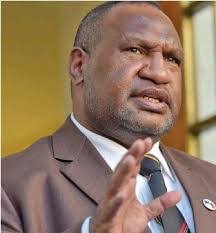Papua New Guinea Prime Minister James Marape said his party has the numbers to form a coalition government, after a national poll plagued by violence, fraud allegations and large numbers of voters missing from the electoral roll.
PNG’s general election, held every five years, is among the world’s most challenging due in part to difficult terrain, extreme weather, poor transport infrastructure, and linguistic and cultural diversity.
Voting began on 04 July and ended on 22 July, but counting was extended until Friday because of special circumstances including security issues, attacks on ballot boxes and logistical challenges, the electoral commission said.
International election observers reported problems ranging from interference in counting by scrutineers and double voting, to large numbers of names missing from electoral rolls.
The Office of the PNG Electoral Commissioner said on Friday – the deadline for an election result under the extension – that it had returned writs for 83 electorates to the governor-general, although counting continued in another 35 electorates.
Marape said a day earlier that his Pangu Party was preparing to form a coalition government with 15 minor parties in parliament on Tuesday, after Pangu won 30 seats which gave it an “overwhelming mandate to form government”.
Pangu, coalition and independent seats totalled 67, he said.
Peter O’Neill, leader of the biggest opposition party, the People’s National Congress, has disputed Pangu can claim a mandate and applied to the Supreme Court to delay parliament’s return on Tuesday.
He failed to win a court injunction on Friday that sought to delay the return of writs until all electorates had finished counting.
Electoral roll problems meant “millions of our people have not voted”, he told reporters on Friday.
The Melanesian Spearhead Group, in an observer report, said the election’s “many challenges” included unexplained delays of up to three days before counting started in some electorates, scrutineer interference, and failure to check voter identity documents.
In some cases, up to half of names of eligible voters were not on electoral rolls, a Commonwealth Observer Group said.
“There are ongoing investigations into some candidates who are believed to have been inciting their supporters to fight with opponents, and arrests will be made,” Police Commissioner David Manning said in a statement.
Disruptions in a Southern Highlands province would not stop the counting of the vote, he warned.
He added there was potential for more confrontation as parliament sits and the court hears disputes over the vote as candidates alleged foul play.
Attempts to disrupt counting had led to arrests, Manning said in an earlier statement.
One fraud allegation in the Southern Highlands involved witness statements that 12,500 ballot papers were “hijacked during polling and stuffed in the ballot boxes” of a different electorate, he said.
Amid the voting, Manning said he had been sickened by election violence in Enga province, where people were killed, and schools, bridges, homes and livestock were destroyed.
Media have reported roughly 50 election-related deaths this year, down from 204 deaths documented in the 2017 vote.
Meanwhile, Pangu Pati has been invited to form government by the Govenor-General.
SOURCE: AAP/PACNEWS














